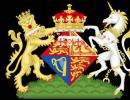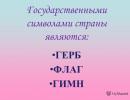The theme of the motherland in the poetry of Mayakovsky. The theme of the Motherland in the work of V. Mayakovsky. Composition based on the work on the topic: The theme of the Motherland and the new man in the lyrics of Mayakovsky
Like the spring of humanity
born
In labor and in battle,
My fatherland
My Republic!
V. Mayakovsky
Whatever V. Mayakovsky wrote about, the main theme in his poems was always the theme of the Motherland, since the poet, in his opinion, is not only a "leader of the people", but also a "people's servant". This great poet put his work in the service of his Motherland, his people, the revolution.
Mayakovsky cared little for abstract, general questions. He actively participated in the life of his country, was aware of all events, sincerely rejoiced at the achievements of the Soviet people, and strove to overcome "survivals". He was interested in specifics, and his works, in which he struggled with all sorts of "rubbish": bureaucracy, vulgarity, philistinism, selfishness, were just as extremely specific. The pen is a formidable weapon of poets, and Mayakovsky skillfully used it.
In his works, the poet often conducts a dialogue or addresses people of different professions, and we understand that these people are alive, with their own thoughts, doing a certain job in building a new world, often even showing heroism. Diligence, readiness for hardships in the name of achieving the cause, self-denial instill joy and optimism in the poet's heart, faith in the creation of a "garden city" on earth:
The city will be, I know - the garden will bloom when such people are in the Soviet country
Mayakovsky spoke of the "hellish" work done by the citizens of the young country: "we illuminate, clothe the poor and bare, the extraction of coal and ore is expanding." According to the poet, in order for the old world to become a thing of the past, it is necessary to actively build a new world, and this is very difficult in the context of famine and devastation that reigned in the country after the imperialist war and in the first years after the revolution.
There Behind the mountains of grief, The sunny land is untouched. For hunger, For pestilence, the sea Print a millionth step!
Mayakovsky feels his strong connection with the people, "with those who went out to build and take revenge in the continuous fever of everyday life." He likes both the "enormity" of the plans of the builders of a new life, and the "span of a sazhen's steps", and the march "by which we go to work and battles." Being involved in the creation of the Fatherland, "which will be," Mayakovsky feels sincere joy:
Citizens! Today, the thousand-year-old "Before" is collapsing. Today, the foundation of the worlds is being revised. Today, To the last button in clothes, we will redo Life again.
Mayakovsky believed in his Land of Soviets. He dedicated to her not only creativity, but also life. The poet's poems are imbued with love for the Motherland, a feeling of deep patriotism, the desire to quickly lead it to a bright and happy future.
The main thing in us
This is our Country of Soviets. Soviet will, Soviet banner, Soviet sun.
Mayakovsky was sure that the time and efforts of his contemporaries to overcome everything obsolete and build a new one would not be in vain. The description of events in novels and other works is a great, divine deed, and joint creativity for Mayakovsky was not only necessary, but also sacred.
Through the revolving bark, To, Dying, Incarnate In steamships, In lines And in other long deeds.
The theme of the Motherland has excited Russian poets since the time of Lomonosov and Derzhavin. They wanted to see their country strong and powerful, they admired and were proud of it. For them, the concepts of the country and the state were a single whole, even if today they are trying to separate them. As if there is a country without a form of government ...
He was the first to speak about "strange love" for the Fatherland, and Nekrasov picked it up. It is from him that the dual perception of Russia originates - a country that is both wretched and plentiful, and powerful and powerless at the same time, which is somehow possible to hate so deeply and love so disinterestedly.
In the work of A. Blok, the theme of the Motherland did not appear immediately. He entered literature as a singer beautiful lady. And only a few years later Blok saw the country and the people. No, he also did not admire everyone. However, the poet was able to find a special charm in the beauty of the Central Russian landscape, in the “robbery” beauty of “poor” Russia, where among the gray huts and wind songs, among the “acute melancholy”, among the endless forests and fields, you suddenly experience inspiration that cannot be compared with anything. Blok quickly moved away from the romanticization of pagan Rus', which is “with swamps, and with cranes, and with the cloudy gaze of a sorcerer”, with “diverse peoples” leading round dances. "The tear-stained and ancient beauty" of Russia, the poet cherished in his soul until last days. The poem “To sin shamelessly, deeply…” The picture drawn in it is frankly unsightly, but it is very Russian - from a deep hangover a person repents, then sins again and falls into a heavy sleep is indicative. Probably Blok, like no one else, knew how to love Russia as it is - with all the ulcers and deformities, and for them too.
The first person to whom he came when he was still quite young in St. Petersburg was Alexander Blok. And Blok noted for himself the melodiousness and purity of Yesenin's early poems. Yesenin never hesitated to openly and uncomplicatedly confess his love for his native land, the Ryazan region, and through it - to go to broad poetic generalizations. He was sure that the feeling of the Motherland is necessary for any poet. Without this feeling, a great poet cannot take place. That is why Yesenin later decisively parted ways with the Imagists. “I love the motherland. I love my motherland very much!” What could be more artless and touching than this confession?
The image of the Motherland in Yesenin's poems is almost always inseparable from natural realities. The birch girl, the maple tree, the wind-boy, the dawn-kitten - this metaphorical series can be continued for a very long time. Man is natural and man-like nature.
And although some of Yesenin’s poems are too rhetorical, for example, the famous ending of the poem “Goy you, my dear Rus' ...”, which contains the opposition of paradise and the earthly Motherland and the poet’s choice is unambiguous - “give my Motherland!”, But what poetry does without rhetoric?
Finally, Vladimir Mayakovsky, who for a long time could not choose between poetry and painting. Futurist and avant-garde in a tie shirt and yellow shirt tie. A man who broke into literature along with other futurists on a wave of scandal and challenge. Did he have a sense of the Motherland and how did it manifest itself?
"I'm not yours, snow freak!" - such a shocking confession can be found in one of the early poems. And even if the last word still rhymes with “motherland”, but the reader understands: no worship, quivering love from Mayakovsky is yet to be expected. He is all in the element of struggle, rejection of what exists, and is waiting for change. And here they are - first February, then October.
“The land with which the two starved together can never be forgotten” - this is written about the hungry years spent in Petrograd. And then the time comes for peaceful construction, and Mayakovsky is included in this process along with everyone else. “I sing my Fatherland, my Republic!” He, as once Lomonosov and Derzhavin, again conjugates the concepts of state and country. He considers it an honor to be called Soviet man. And suicide in 1930 happened on personal grounds, and not because of disappointment in ideals. Mayakovsky sincerely gave all his strength as a poet to the "attacking class", achieved that "the pen was equated with a bayonet." Yet most of his poems Soviet period remained in their time. They are unworthy of Mayakovsky's pen, they were written on the topic of the day, on a specific occasion.
And the theme of the Motherland is an “eternal” theme. She doesn't age. There is no doubt that professional poets and amateur poets will write a lot more on this topic. Not always skillfully, if only completely sincerely. So that they can repeat after S. Yesenin: "I never lie with my heart."
like the spring of mankind,
born
in labor and in battle,
my fatherland
my republic!
V. Mayakovsky
Whatever V. Mayakovsky wrote about, the main theme in his poems was always the theme of the Motherland, since the poet, in his opinion, is not only a “leader of the people”, but also a “people's servant”. This great poet put his work in the service of his Motherland, his people, the revolution.
Mayakovsky cared little for abstract, general questions. He actively participated in the life of his country, was aware of all events, sincerely rejoiced at the achievements of the Soviet people, and strove to overcome "survivals". He was interested in specifics, and his works, in which he struggled with all sorts of "rubbish": bureaucracy, vulgarity, philistinism, egoism, were just as extremely specific. The pen is a formidable weapon of poets, and Mayakovsky skillfully used it.
In his works, the poet often conducts a dialogue or addresses people of different professions, and we understand that these people are alive, with their own thoughts, doing a certain job in building a new world, often even showing heroism. Diligence, readiness for hardships in the name of achieving the cause, self-denial instill joy and optimism in the poet’s heart, faith in the creation of a “garden city” on earth:
I know - the city will be, I know - the garden will bloom when there are such people in the Soviet country!
Mayakovsky spoke of the “hellish” work done by the citizens of the young country: “we illuminate, clothe the poor and bare, the extraction of coal and ore is expanding.” According to the poet, in order for the old world to become a thing of the past, it is necessary to actively build a new world, and this is very difficult in the conditions of famine and devastation that reigned in the country after the imperialist war and in the first years after the revolution.
There, beyond the mountains of grief, there is no end of the sunny land. For hunger, for pestilence, the sea print a millionth step!
Mayakovsky feels his strong connection with the people, "with those who went out to build and take revenge in the continuous fever of everyday life." He also likes the “enormity” of the plans of the builders of a new life, and “the sweep of the steps of a sazhen”, and the march “by which we go to work and battles”. Being involved in the creation of the Fatherland, "which will be," Mayakovsky feels sincere joy:
Citizens! Today, the thousand-year-old "Before" is collapsing. Today the worlds basis is being revised. Today, to the last button in our clothes, we will redo life again.
Mayakovsky believed in his Land of Soviets. He dedicated to her not only creativity, but also life. The poet's poems are imbued with love for the Motherland, a feeling of deep patriotism, the desire to quickly lead it to a bright and happy future. material from the site
... the main thing in us is our Country of Soviets. Soviet will, Soviet banner, Soviet sun.Mayakovsky was sure that the time and efforts of his contemporaries to overcome everything obsolete and build a new one would not be in vain. Creativity is a great, divine thing, and joint creativity for Mayakovsky was not only necessary, but also sacred.
We go through the barking of revolvers, in order, dying, to be embodied in steamships, in lines and in other long deeds.
Didn't find what you were looking for? Use the search
On this page, material on the topics:
- Mayakovsky poems about the motherland analysis
- find popular expressions in Mayakovsky's work
- essay on the theme of the homeland in the work of Mayakovsky
- homeland in the works of Mayakovsky briefly
- essay on the theme of the homeland in the work of Mayakovsky
Essay text:
And I,
like the spring of mankind, born
in labor and in battle, I sing
my fatherland, my republic!
V. Mayakovsky
Whatever V. Mayakovsky wrote about, the main theme in his poems was always the theme of the Motherland, since the poet, in his opinion, is not only a "leader of the people", but also a "people's servant". This great poet put his art into the service of his Motherland, his people, the revolution.
Mayakovsky cared little for abstract, general questions. He actively participated in the life of his country, was aware of all the events, sincerely rejoiced at the achievements of the Soviet people, and strove to overcome the "survivors". He was interested in specifics, and his works were just as extremely specific, in which he fought all kinds of "rubbish": bureaucracy, vulgarity, philistinism, selfishness. The pen is a formidable weapon of poets, and Mayakovsky skillfully used it.
In his works, the poet often conducts a dialogue or addresses people of different professions, and we understand that these people are alive, with their own thoughts, doing some work in building a new world, often even showing heroism. Diligence, readiness for hardships in the name of achieving the goal, self-denial instill joy and optimism in the heart of the poet, faith in the creation of a "garden city" on earth:
I know
city
will,
I know
garden
bloom.
When
such
People
in the country
Soviet
There is!
Mayakovsky spoke of the "hellish" work done by the citizens of the young country: "we illuminate, clothe the poor and bare, the extraction of coal and ore is expanding." According to the poet, in order for the old world to become a thing of the past, it is necessary to actively build a new world, and this is very difficult in the context of famine and devastation that reigned in the country after the imperialist war and in the first years after the revolution.
There
beyond the mountains of grief
the sunny edge is unfinished.
For the hunger
beyond the sea
print a millionth step!
Mayakovsky feels his strong connection with the people, "with those who went out to build and take revenge in the continuous fever of everyday life." He likes both the "enormity" of the plans of the builders of a new life, and the "span of a sazhen's steps", and the march "by which we go to work and battles." Being involved in the creation of the Fatherland, "which will be," Mayakovsky feels sincere joy:
Citizens!
Today, the thousand-year-old "Before" is crumbling.
Today the worlds basis is being revised.
Today
down to the last button in your clothes
Let's redo life.
Mayakovsky believed in his Land of Soviets. He devoted to her not only creativity, but also life. The poet's poems are imbued with love for the Motherland, a feeling of deep patriotism, the desire to quickly lead it to a bright and happy future.
... the main thing in us
this is our
Soviet country. soviet will,
soviet banner,
Soviet sun.
Mayakovsky was sure that the time and efforts of his contemporaries to overcome everything obsolete and build a new one was not in vain. Creativity is a great, divine thing, and joint creativity for Mayakovsky was not only necessary, but also sacred.
We are going
through the revolver bark,
to,
dying
incarnate
on the steamships
in lines
and in other long cases.
The rights to the composition "The theme of the Motherland in the work of V. Mayakovsky" belong to its author. When citing material, it is necessary to indicate a hyperlink to
Mayakovsky V.V.
Composition based on the work on the topic: The theme of the Motherland and the new man in the lyrics of Mayakovsky
I met Mayakovsky's first poem at the age of five. Mom read to me “What is good and what is bad?”. I still remember many lines from it. Hundreds of vivid lines of the poet from his poems entered our conversation, into our life, became folk sayings.
Mayakovsky was a peculiar and rather interesting personality. “All the pain and all the joy of the working man, hatred for tsarism, the bourgeoisie, imperialist war; faith in the victory of the revolution and socialism; the greatest love and respect for Lenin.”
About love for the Motherland and about the happiness of being her son, citizen, participant in her creative achievements and flourishing, the last of Mayakovsky’s completed poems is “Good!”. It is about love and happiness obtained "in labor and battle." The poem "Good!" is a hymn socialist revolution. In Mayakovsky lived the son's great love for the socialist fatherland. The poet was and remains in our hearts a true fighter. He checked the dignity of his poems and poems by meeting with the people. He traveled a lot, and these hundreds of trips were for him both a school of life and a “showcase” of his revolutionary poetry. Giving "all his ringing power as a poet" to the revolution, Mayakovsky terribly hated the enemies of the Soviet country, the Motherland, he hated the townsfolk, the bourgeoisie. He directed all his passion against those who prevent us from building and living in the young Soviet republic. All his deeds and thoughts were directed to the future. Vladimir Mayakovsky wanted to be and became the prophet and banner of the revolution.
Mayakovsky's work after October is filled with a powerful, indestructible love of life. The theme of joy is firmly included in it. “Drink joy! Sing! Spring is in my veins!” (“Our march”). The feeling of joy not only does not weaken in the poems of the poet of the twenties, on the contrary, it becomes fuller, deeper. This is the happiness of merging with the people: -
I am happy that I am a particle of this force.
This is the joy of giving people the best that you yourself have - your work, and thereby making their life richer and happier:
I
myself
feel soviet
happiness plant.
This admiration for the beauty of life:
Joy pret. Not for you
give us? Life is great and
amazing.
One of my favorite poems is “The Story of Kuznetskstroy and.”. It shows not one hero, but mass heroism. The poem reflects the labor enthusiasm that has gripped millions of people, which history has not yet known. Therefore, the hero of the poem is not the narrator, but the collective. We do not see the building itself. Mayakovsky speaks of people who have just arrived at the new building in order to erect a wonderful city-garden in the wilderness. People are just getting ready for work, there are huge difficulties ahead, but even now their life - in the open air, in dank dampness, starving - is a daily feat. And they endure all these hardships, inconveniences, prompted not by a thirst for personal gain, but by a deep understanding of the greatness of the goal:
Drain lips
from the cold, but lips
whisper in harmony: “In four
years here
there will be a garden city!”
The poet supports this initiative. He is sure that no obstacles and hardships will break their will to win.
I know the city
will, I know - the garden
bloom when
there are such people in the Soviet country!
I think that Mayakovsky in this poem wanted to show a new person, a person of the future.
In his mind, he was an honest man, deeply devoted to the idea, capable of self-sacrifice, a citizen of the country.
Mayakovsky believes in the future of the country. In the "October" poem, we feel it. Talking about the difficult years of the young republic, the author gradually moves to the image of the Motherland, “the land that he conquered and half-dead nursed”. Here the author deepens his idea that it is impossible to live separately from everyone, that each person is inseparable from the life of the people.
Today, almost everyone knows Mayakovsky, they know that he “lives” with us even now. His books live, “fight” and shine for us. And the name of Mayakovsky, his words will never be forgotten. http://www.





